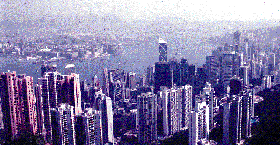CONTACT US
|
ADVERTISING INFO
© 1996-2013 Asian Media Group Inc
No part of the contents of this site may be reproduced without prior written permission.
HONG KONG, TESTOSTERONE &
BIRTH OF THE ASIAN CENTURY
Testosterone poisoning could turn the coming century from one of global prosperity to one of more pointless brinksmanship.
by Tom Kagy
PAGE 1 OF 8
| He is said to have unzipped, whipped out his johnson and snarled, "What's Ho got to match this!" |
 didn't just screw Ho Chi Minh," gloated Lyndon Johnson after a
bombing strike on a North Vietnamese petroleum depot, "I cut his pecker
off." The pronouncement was a bit premature, as Johnson would learn. Much
later in the war, after Ho had proven a far tougher foe than Johnson expected,
he is said to have unzipped, whipped out his johnson and snarled, "What's Ho
got to match this!"
didn't just screw Ho Chi Minh," gloated Lyndon Johnson after a
bombing strike on a North Vietnamese petroleum depot, "I cut his pecker
off." The pronouncement was a bit premature, as Johnson would learn. Much
later in the war, after Ho had proven a far tougher foe than Johnson expected,
he is said to have unzipped, whipped out his johnson and snarled, "What's Ho
got to match this!"
Politicians, academics, journalists and intellectuals labor to explain global shifts in terms of trade balances, political agendas and even, on occasion, cultural sensitivities. Seldom, if ever, do their discussions acknowledge the role testosterone plays. Too bad, because as we move into the next century, this hormone of aggression will become an even more important fuel for the machinery of international relations. Good and noble objectives--compounded by innocent miscalculation--underlay Lyndon Johnson's decision to have U.S. GIs go from acting as advisors to fighting the Vietnam War. At some point, however, Johnson felt that American manhood, and perhaps his own, was on the line and his decisions began showing the effects of testosterone poisoning--to the world's great distress. In that regard Johnson is different from other U.S. leaders only in his figures of speech.
Until recently the U.S. has been rich and powerful enough in relative terms to afford the consequences of testosterone-poisoned policies. For most of this century Asian leaders--consumed by the need to catch up to the west economically--have deferred hormonal gratification. With rare exception, they have either backed down from direct confrontation with the west or entered reluctantly into unavoidable confrontations. That's changing quickly.

The return of Hong Kong marks an important step in China's long road back from two centuries of humiliation at the hands of western powers.
Now that Asia has attained industrial parity with the west and, more
importantly, built momentum toward an Asian Century, its leaders enjoy the
option, even the mandate, to respond to offense with offense in dealings with
the west. In other words, testosterone has begun flowing as freely in Asia as
it does in the U.S. Humanity's prospects for the future will hinge on how well
U.S. leaders adjust to an era in which Asian leaders will insist on dealing on
an equal footing.
Neither side is oblivious to these economic realities and the awareness
tempers dealings. But put national prestige and manhood too squarely into
the picture and economic considerations take a back seat. During Taiwan's
1996 presidential election China fired missiles into the waters off Taiwan's
northern and southern tips and warned the U.S. not to send ships into the
Taiwan Strait. The U.S. streamed two carrier groups toward Taiwan's east
coast. China responded by publicly opining that the U.S. Navy would turn tail
after its first hundred fatalities. That's unbelievably provocative language
between key trading partners, either one of which has the ability to render
the earth uninhabitable.
PAGE 2
| PAGE 1 | 2 | 3 | 4 | 5 | 6 | 7 | 8 |
